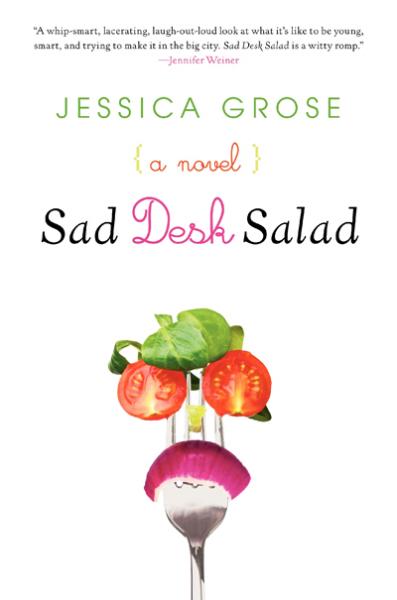SAD DESK SALAD by Jessica Grose
As a writer for Chick Habit, an increasingly popular women’s website, Alex Lyons gets paid to be a bitch. She’s churning out several posts a day, and she saves her juiciest ones for blog prime time, when working women eat their sad desk salads in their offices. Alex tells herself she’s fulfilling her dream of being a professional writer; so what if it means being glued to her couch and her laptop from six a.m. to six p.m., scouring the web in search of the next big celebrity scandal? Since Chick Habit’s parent company keeps close tabs on page views, Alex knows her job is always at risk.
So when an anonymous tipster sends her the year’s most salacious story—a politico’s squeaky-clean Ivy League daughter caught in a very R-rated activity—it’s a no-brainer. But is Alex really willing to ruin the girl’s life by igniting the next Internet feeding frenzy? And what she doesn’t yet realize is how this big scoop is about to send her own life spiraling out of control.
Valerie Frankel calls SAD DESK SALAD “The Devil Wears Prada for the blogger age. A laser-focused snapshot of our time, the novel gives readers an insider’s perspective on the tenty-four/seven grindhouse of celebrity-obsessed new media. Funny and heartfelt, a must read.” If that doesn’t grab you, maybe this interview with Jessica will.
Q: SAD DESK SALAD gives readers an insider’s view into the life of a blogger, and it’s not always so glamorous. Did you draw on some of your own experiences?
A: I did! I worked from home for two years when I was freelance and also when I was an editor at Jezebel. You can get a little weird when you’re only communicating with people through blog posts and IMs all day. My then-boyfriend now-husband would laugh at me because he would walk through the door at the end of the work day and I would be so desperate for person-to-person contact that I would just babble for about ten minutes as soon as he got home.
Q: How has online media changed celebrity, or has it?
A: It has changed celebrity in some ways. It depends on your definition of celebrity. It’s much, much easier to become nationally notorious without really doing anything–or even really wanting to become notorious. I always go back to the example of Karen Owen, the recent college graduate who made headlines for weeks a few years back because she wrote “the Duke Fuck List”– a power point presentation of her sexual conquests that was just meant for her friends. But it ended up going viral, and days later she was a hot topic on the Today Show. That never would have happened pre-Internet. But, that kind of celebrity fades very quickly. For real celebrities, famous actors and politicians, they have less privacy than they used to because of the Internet (see Anthony Weiner’s Twitter scandal or Prince Harry’s naughty Las Vegas shots from earlier this year).
Q: Do you think modern journalist have a different code of ethics than say those of the early/mid-twentieth century?
A: I don’t think the code of ethics is different, but I do think new technologies always bring with them new ethical challenges. The Internet gives us tremendous power when it comes to the release and reproduction of information, and we’re still negotiating the best ways to navigate that. All of the discussions that have arisen from the Jonah Lehrer self-plagiarism scandal show that we’re still working out the kinks as a profession when it comes to what is right and wrong.
Q: How do you think online or social media will effect this election, or even the future of politics?
A: The amount of data mining that both Republicans and Democrats are doing right now is truly staggering. So I think social media is deeply changing politics in ways that are way beneath the surface. As for the more surface stuff, like evidence of youthful transgressions preserved forever on Facebook, most candidates came of age in the pre-Internet era. But, in ten years, we’re going to see a lot more embarrassing photos of candidates’ collegiate debauchery. At some point soon, a photo of a potential candidate smoking a joint or posing suggestively will be totally unremarkable. I give that 20 years.
Q: With the speed at which online media can communicate news, and the greatly increased number of outlets seeking the ultimate scoop do you think there is more pressure be more cut throat?
A: Tough to say. I’ve only experienced life as a journalist in the post-Internet era. Things sounded pretty cut throat in the past! The medium and the methods are just different.
Q: Any suggestions for keeping a positive online presence?
A: Friends don’t let friends drink and tweet.

